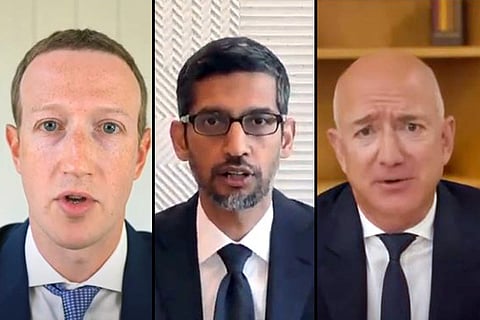

Facebook's Mark Zuckerberg, Amazon's Jeff Bezos, Sundar Pichai of Google and Tim Cook of Apple faced hours of grilling on Wednesday as Congressional lawmakers questioned the CEOs of Big Tech over their dominance and allegations of monopolistic practices that stifle competition. But it's not clear how much they advanced their goal of bringing some of the world's largest companies to heel.
Among the toughest questions for Google and Amazon involved accusations that they used their dominant platforms to scoop up data about competitors in a way that gave them an unfair advantage.
And they had a few rough moments. Pichai and Zuckerberg, for instance, appeared discomfited when pressed about unsavory aspects of their companies' businesses, but got respites when their inquisitors ran out of time.
The panel's chairman, Rep. David Cicilline, a Rhode Island Democrat, said each platform controlled by Facebook, Amazon, Google and Apple is a bottleneck for a key channel of distribution. Whether they control access to information or to a marketplace, these platforms have the incentive and ability to exploit this power, he said.
They can charge exorbitant fees, impose oppressive contracts, and extract valuable data from the people and businesses that rely on them. Simply put: They have too much power.
The four CEOs command corporations whose products are woven into the fabric of everyday life, with millions or even billions of customers, and a combined market value greater than the entire German economy. One of them, Bezos, is the world's richest individual; Zuckerberg is the fourth-ranked billionaire.
Bezos acknowledged that alleged misdeeds at Amazon such as reports that the company has used data generated by independent sellers on its platform to compete against them would be unacceptable if proven to be true.
Bezos, who was appearing before Congress for the first time, said he couldn't guarantee that the company had not accessed seller data to make competing products, an allegation that the company and its executives have previously denied.
“We have a policy against using seller specific data to aid our private label business”, Bezos said in a response to a question from Rep. Pramila Jayapal, a Washington Democrat. “But I can't guarantee to you that that policy hasn't been violated.”
Pichai seemed to have been appealing to the specific interests of legislators. In his opening remarks, he touted Google's value to mom-and-pop businesses in Bristol, Rhode Island, and Pewaukee, Wisconsin, which just happen to be located in the home districts of Cicilline and Rep. James Sensenbrenner of Wisconsin, the panel's senior Republican.
But the Google executive struggled as Cicilline accused the company of leveraging its dominant search engine to steal ideas and information from other websites and manipulating its results to drive people to its own digital services to boost its profits.
Pichai repeatedly deflected Cicilline's attacks by asserting that Google tries to provide the most helpful and relevant information to the hundreds of millions of people who use its search engine each day in an effort to keep them coming back instead of defecting to a rival service, such as Microsoft's Bing.
The executives provided bursts of data showing how competitive their markets are, and the value of their innovation and essential services to consumers.
They provided lots of data purporting to show how much competition they face and just how valuable their innovation and essential services are to consumers. But they sometimes struggled to answer pointed questions about their business practices. They also confronted a range of other concerns about alleged political bias, their effect on U.S. democracy and their role in China.
The four CEOs were testifying remotely to lawmakers, most of whom were sitting, in masks, inside the hearing room in Washington.
For the last year, that panel has probed the business practices of the Silicon Valley giants with an eye to determining if they need to be regulated more heavily, or even broken up.
In nearly five hours of testimony and questioning, while the executives faced hostile questioning and frequent interruptions from lawmakers of both parties, little seemed to land more than glancing blows.
“Today we had the opportunity to hear from four of the most powerful companies in the world. This hearing has made one fact clear to me, these companies as they exist today have monopoly power. Some need to be broken up, all need to be properly regulated and held accountable. We need to ensure that the antitrust laws first written more than a century ago work in the digital age. When these laws were written the monopolists were men named Rockefeller and Carnegie. Their controls of the marketplace allows them to do whatever it took to crush independent businesses and expand their own power. The names have changed, the stories are the same. Today the names are Zuckerberg, Cook, Pichai and Bezos. Once again their control of the marketplace allows them to do whatever it takes to crush independent business and expand their own power. This must end," concluded Chairman Cicilline.
With PTI inputs